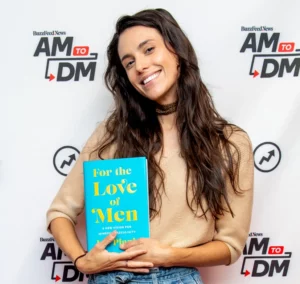Podcast: Play in new window | Download (Duration: 57:53 — 132.5MB)
Subscribe: Apple Podcasts | Spotify | Amazon Music
Bonus Episode –
Barbie isn't anti-man – it's anti-patriarchy
“If you are a guy who doesn't like the Barbie movie, it means you probably don't like patriarchy.” Liz Plank
The Barbie movie has sparked great controversy. While some claim it to be “anti-man” others view it as a strategic call out to the challenges both men and women face on a regular basis. We've learned to view the world through a patriarchal lens, so when it's flipped only then can we see how those in power mistreat those who aren't. This is pro-anyone wanting secure relating and mutuality – all genders welcome!
Ann and Sue are joined by Liz Plank to dive into the symbolism of the Barbie movie and how it applies to real life and secure relating. Listen now to explore patriarchy, masculinity, and the hierarchies of our society – and important steps we can take to build security through vulnerability for a more inclusive world.
“Pro-patriarchy hurts everyone where feminism liberates everyone.” – Liz Plank
Patriarchy reversed – Secure relating and Barbie
Time Stamps for Barbie Movie
5:30 – Finding security comes through vulnerability
10:12 – Looking at the different layers of feminism in the movie
14:29 – Understanding matriarchy
20:22 – Symbols of vulnerability
25:16 – Break down of Ken’s characters' correlation between dominance and lack of happiness
26:51 – Men and understanding their idealized masculinity
33:54 – Why the “all men are bad” narrative can be destructive to feminism
37:04 – Break down of America Ferrera’s speech
39:01 – Reimagining masculinity for growth
46:51 – Who is Barbie?
51:18 – Correlation between power and mirror neuron system disengagement
57:51 – Do men and women feel security in the same ways?
1:03:59 – Toxic invulnerability instead of toxic masculinity
1:08:22 – Looking beyond the gender binary for repair
1:10:52 – Reframing to understanding inclusive hierarchies & masculinity are not all bad
About our Guest – Liz Plank
 Liz is an award-winning journalist, international bestselling author and has been the executive producer and host of several critically acclaimed digital series at Vox Media and NBC News. She is the CEO of Liz Plank Productions and is a columnist for MSNBC and has been listed as one of Forbes’ 30 Under 30, Mediaite’s Most Influential in News Media, and Marie Claire’s Most Powerful Women, and was named one of the World’s Most Influential People in Gender Policy by Apolitical. Liz regularly appears on national and international television programs to provide a perspective on politics, gender issues, and reproductive rights, including The Today Show, The Daily Show, MSNBC, CNN, ABC News, Fusion, Al-Jazeera America, and BBC World. Through her activism and creative approach to journalism, Liz has made it her mission to elevate the voices of those who are often not heard. Before becoming a journalist, Liz worked at a community center for people with disabilities and was a researcher and behavioral science consultant at the London School of Economics, from which she holds a master's degree in policy with an emphasis on global gender politics.
Liz is an award-winning journalist, international bestselling author and has been the executive producer and host of several critically acclaimed digital series at Vox Media and NBC News. She is the CEO of Liz Plank Productions and is a columnist for MSNBC and has been listed as one of Forbes’ 30 Under 30, Mediaite’s Most Influential in News Media, and Marie Claire’s Most Powerful Women, and was named one of the World’s Most Influential People in Gender Policy by Apolitical. Liz regularly appears on national and international television programs to provide a perspective on politics, gender issues, and reproductive rights, including The Today Show, The Daily Show, MSNBC, CNN, ABC News, Fusion, Al-Jazeera America, and BBC World. Through her activism and creative approach to journalism, Liz has made it her mission to elevate the voices of those who are often not heard. Before becoming a journalist, Liz worked at a community center for people with disabilities and was a researcher and behavioral science consultant at the London School of Economics, from which she holds a master's degree in policy with an emphasis on global gender politics.
Resources for today's episode on the Barbie movie
Loneliness and Social Isolation Linked to Serious Health Conditions – CDC study on isolation
“Man Enough – Dating, Consent, Boundaries & Respect” – podcast with Jamey Heath & Justin Baldoni
Barbie Movie – Info, description, cast & characters
Don't Think of an Elephant!: Know Your Values & Frame the Debate by George Lakoff – Book referenced by Liz Plank
Armchair Expert Podcast: Synced – New podcast with Monica Padman
Airplane Mode – Liz Plank's Substack
@feministafabulous – Liz Plank's Instagram
@lizplank– Liz Plank's Tiktok
Facebook – Liz Plank's Facebook page
For the Love of Men: From Toxic to a More Mindful Masculinity – Liz Plank's Book
Elizabeth Planks' Website – Resources, bios, and important links
TU119: For the Love of Men, Rethinking Masculinity with Liz Plank
We support mental health access to those traditionally left out of mainstream healthcare and use a portion of the income we receive from corporate sponsors to do just that! We can only do that with the help of our Patrons – joining as a TU Neuronerd Podsquad premium subscriber, you support this mission and get a dedicated ad-free feed plus occasional very cool and unique study opportunities, reading groups and who knows what else may come! We invite you to join our community. Click here to join!
Click here to view today's episode on

Please consider giving to Mental Health Liberation
We support mental health access to those traditionally left out of mainstream healthcare and use a portion of the income we receive from corporate sponsors to do just that! We can only do that with the help of our Patrons – joining as a TU Neuronerd Podsquad premium subscriber, you support this mission and get a dedicated ad-free feed plus occasional very cool and unique study opportunities, reading groups, and unique surprises! We invite you to join our community. Click here to join!
Mental Health Liberation is our charity of choice – please consider giving whatever you can to support mental health access for those traditionally left behind and support training for BIPOC therapists.















